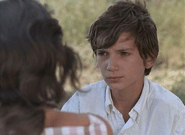In Luc Moullet’s essay, Better to Burn Out than to Fade Away: Blue Collar Dandy, Moullet frames Jean Eustache’s decision to film his grandmother Odette Robert for Numéro Zéro within the context of the postwar generation’s mindset:
Grandparents played an important role in the lives of many French filmmakers during this period. The generation born in the Twenties often sent their children to the countryside to live with their grandparents: this allowed the children to be better fed during the German Occupation, and the parents to enjoy life immediately after the war. The result was a reverence for grandparents and a rejection of the father and mother – a crisis that fertilized a number of artistic careers.
This sense of dislocation (in some ways, a retreat towards an idealized past), absence, and rootlessness captures the awkward adolescence of a young boy – later identified as Daniel (Martin Loeb) – in Eustache’s semi-autobiographical film, Mes petites amoureuses as well. Nostalgic without being sentimental, the autofictional image of a restless youth embodied by Daniel – an impotent rage that is revealed in an early episode when he attacks a classmate without provocation at the schoolyard – invites immediate comparison with François Truffaut’s iconic alterego, Antoine Doinel or the fragile Laurent in Louis Malle’s Murmur of the Heart. Forced to leave the comfort of his doting grandmother’s house when his mother (Ingrid Caven) moves to another town in order to live with her Spanish lover, the turning point is presaged in Daniel’s parting conversation with his neighboring playmates on the way to the train station, remarking that he was not leaving for the summer, but “for always” – the acknowledgement of a juncture away from childhood that is also reinforced in his first unaccompanied train trip.
Rather than a chronicle of the serial misadventures of a wayward young hero, Eustache’s penchant for distilled naturalism and rigorous attention to detail suggests even greater affinity with Maurice Pialat, a shared aesthetic that is further reinforced through Pialat’s appearance in the film as a visitor who challenges Daniel on his academic knowledge (placing great importance on learning the fundamentals that also reflects their like-minded approach to filmmaking). Having abandoned his education when his mother could not afford to pay for incidental school expenses, Daniel bides his time drifting through the bucolic small town, observing – and mimicking – their local rituals, working as an apprentice in a mechanic’s shop, and falling into the company of other aimless, out of school boys at a café watching people go by. In its patient observation and consciousness of time’s passage, the film also converges towards Eustache’s pastoral documentaries, a conscious attempt to capture a quotidian memory destined to fade away: the novelty and exoticism that the arrival of the traveling circus represents, the town square promenades where people choreograph their “chance” meeting with potential romantic interests, the matinees where strangers steal kisses under the cover of a darkened theater. In this respect, Daniel’s imitative gestures not only serve to reinforce his learned social behaviors as a way of conforming to the world around him, but also become figurative rehearsals in his own journey towards maturity. It is this transformative journey that is poetically crystallized in his bicycle ride with friends to a neighboring town – a day trip that culminates with Daniel revealing his name to a girl (and to the audience) for the first time after a hard fought moment alone with her – in a sense, breaking away from the pack to assert his own identity.
© Acquarello 2008. All rights reserved.
First published in The Auteur’s Notebook, 04/29/08.
